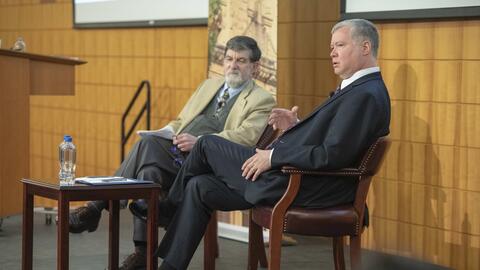Stay Connected
Koreans Should "Just Look Up"

Ambassador Jung-Seung Shin, the Winter 2023 Payne Distinguished Fellow, offered insights into the dynamics of the trilateral U.S.-China-South Korea relationship, the impacts of the great power competition between the United States and China on South Korea, and the prospects for enhanced Korea-U.S. collaboration.

Research by Stanford health economist Karen Eggleston, the director of APARC's Asia Health Policy Program, offers evidence on the link between medical spending and health outcomes in South Korea, showing how the country can benefit from developing a “satellite account for health” to promote high-value innovations for longer, healthier lives.

The time has come to depoliticize North Korean human rights. South Korean progressives have argued that working to improve human rights in North Korea threatens to worsen inter-Korean relations and makes addressing security threats difficult, but the Moon administration failed to make progress in security or relations despite sidelining human rights. The Yoon administration should work on multilateral approaches to address the state of human rights in the North and reach a domestic bipartisan consensus on the issue.
Look South
Opportunities for Korea-India Relations

To support Stanford students working in the area of contemporary Asia, the Shorenstein Asia-Pacific Center is offering research assistant positions for the duration of the 2023 summer quarter, a predoctoral fellowship for the duration of the 2023-24 academic year, and a Diversity Grant that funds research activities by students from underrepresented minorities.

A Conversation with Francis Fukuyama on the Challenges of a Changing Global Order

Demographic Headwinds
Demographic Headwinds
Can Korea Avoid Japan’s Lost Decade?
This fall, APARC brought together scholars and policy experts to examine the security competition that has come to define an era from the perspectives of Asian nations.

Sponsored by Stanford University’s Shorenstein Asia-Pacific Research Center, the annual award recognizes outstanding journalists and journalism organizations for excellence in coverage of the Asia-Pacific region. News editors, publishers, scholars, and organizations focused on Asia research and analysis are invited to submit nominations for the 2023 award through February 15.

Co-organized by Stanford’s Walter H. Shorenstein Asia-Pacific Research Center and the Ban Ki-moon Foundation for a Better Future, the inaugural Trans-Pacific Sustainability Dialogue brought together a new network of social science researchers, scientists, policymakers, and practitioners from Stanford University and across the Asia-Pacific region to accelerate action on the United Nations-adopted Sustainable Development Goals (SDGs).
Walking a Tightrope
As U.S.-China tensions escalate, Korea must chart a new path.

Despite obstacles and risks, there are good reasons why South Korea should want to increase deterrence against China. In a new article, Center Fellow Oriana Skylar Mastro and co-author Sungmin Cho chart an optimal strategy for Seoul to navigate the U.S.-China rivalry and support efforts to defend Taiwan.

In China, Xi Jinping Is Getting an Unprecedented Third Term. What Should the World Expect?
Xi's plans are long term and unlikely to shift, but he can now be more aggressive than before in their pursuit.

Lessons from the United States

The Trans-Pacific Sustainability Dialogue convenes social science researchers and scientists from Stanford University and across the Asia-Pacific region, alongside student leaders, policymakers, and practitioners, to generate new research and policy partnerships to accelerate the implementation of the United Nations-adopted Sustainable Development Goals. The inaugural Dialogue will be held in Seoul, Republic of Korea, on October 27 and 28, 2022.

Two PhD students were awarded the 11th annual Korea Program Prize for Writing in Korean Studies for their papers.
APARC and CSIS gather experts from academia and the policy world to call attention to the role of the South Korean and U.S. governments in addressing the North Korean human rights crisis and urge the Biden administration to fill in the role of Special Envoy on North Korean Human Rights, a position established by U.S. law.

Research Assistant Spotlight: Kerstin Norris Examines Race and Racism in Asia with Gi-Wook Shin
MA in East Asian Studies candidate Kerstin Norris spent the summer assisting APARC and Korea Program Director Gi-Wook Shin with his research on racial tensions in Asia. Looking to pursue a PhD in Sociology, Norris found tremendous value in a collaborative academic environment. We spoke with Norris about her experience as a research assistant and her time working with Dr. Shin.

The Path Ahead for Yoon
The Path Ahead for Yoon
How Korea’s New President Can Recover from His First 100 Days of Struggles.

The Center offers a suite of fellowships for Asia researchers to begin fall quarter 2023. These include postdoctoral fellowships on contemporary Japan and the Asia-Pacific region, inaugural postdoctoral fellowships and visiting scholar positions with the newly launched Stanford Next Asia Policy Lab, and fellowships for experts on Southeast Asia.

The Korean Wave, which has unique characteristics and continues to evolve in intriguing directions, could become a first mover on the global cultural scene.

A social and corporate culture that values and enforces conformity surely cannot be a wellspring of creativity and innovation. Korean society must find a new source of vitality. Enhancing diversity to stimulate innovation and change could be the answer.

It is difficult to anticipate how the geopolitical storm set off by Russia’s invasion of Ukraine may develop. What is certain is that the international order will not be the same, and this change will have significant repercussions for South Korea.






